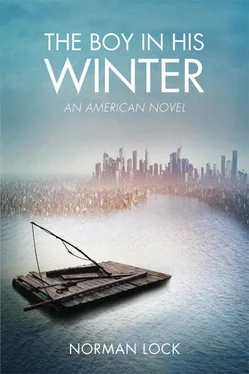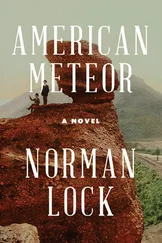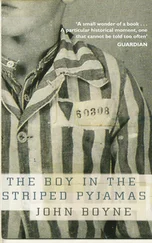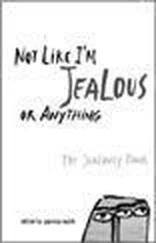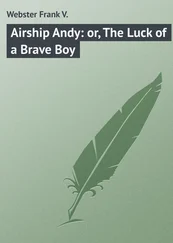You say, this is no way to tell a story. That I’ve been merely threading one incident after another on a string of recollection and conjecture. Maybe so. But I don’t know any other way.
Later, when we were once again on our own, I asked Jim to cast the bones concerning my future. He did.
“What do you see, Jim?”
“You will live long,” he said, studying the augury, “but not happily.”
And then he cast them for himself.
“What do you see, Jim?”
He shrugged and said, “Neither happily nor long.”
I was sorry about that.
I’ve neglected to describe the beauties of the way. Let me do so now: The river was wide and brown. Where I had seen the water close over the old man’s head, a cloud of midges wavered. The shore on either side heaved up into wooded hills whose trees shook and swelled in the wind that was corrugating the surface of the river and dispersing the midges before the trout could rise to them. (Thus are we cheated of our rightful expectations.) A shadow swung out suddenly like an enormous hinge, darkening the hills and also our raft. Our sweat-dampened shirts chilled us, and we shivered as though we held in our hands a warrant for our own deaths.
“Passenger pigeons,” said Jim.
“Look at them!” I said in admiration, as anyone does who looks on immensity.
They were countless as stars, as grains of dust, as the dead lying underground or underwater. Birds in their millions, sweeping overhead like a dark aerial river. They moved as one bird, as if at the behest of a common intelligence. I thought to myself there would never be so many again. Jim scried their future in a crystal ball that had belonged to Marie Laveau, which all this time he had kept secret from me. I did not ask how he’d come to have it, whether she had made him a present of it or he’d stolen it because of a passionate, overmastering desire to see what is hidden from us.
“On September first, 1914, the last passenger pigeon left on earth will die in the Cincinnati Zoo,” he said, wrapping the crystal in a piece of black cloth. “Her name will be Martha, named for the first First Lady.”
“How can that be, Jim?”
“I see it and much else besides: the end of many, many species. The last of the elephants will die in chains,” he said, and I knew he was thinking, too, of his own kind.
In 2034, during a boat show, I would visit the Cincinnati Zoo. There were no animals, only plasma screens, each showing a video of the poor beast that had once occupied the cage. The videos played in endless loops while zoo visitors tossed peanuts into the otherwise clean cages, in homage to what was irretrievably lost or as a ritual whose object was forgotten. I don’t recall having seen a memorial to Martha. I do recall having seen in the capital a heroic statue in bronze of General Grant on his horse Cincinnati, whose genus, Equus, has very nearly followed so many others into extinction. I didn’t give a damn, but now that I, too, have an end in sight, I feel sentimental toward all who are fated to disappear. Like tumbled columns, the wreckage of time is submerged in the river at its end — choked with the silt of hours beyond reckoning, compounded of blood, bone, gold, rust, and ashes. Jim and I shuttled toward the Gulf on time’s vast loom — one year yielding to the next in a continuous stream whose noise was like rain or like the wind in Wyoming, which is said never to cease.
On the heights above Fort Adams, where the treaty had been signed expelling the Choctaw from their aboriginal homeland, a flaming cross was decorating the night sky. I thought it was a pretty sight. I wondered if I would see the old man again who’d killed himself in order to save time or trouble or else to rush into the land of the dead, which would — he believed in his bones — give him ease. If I were to come upon him standing ghostly on the river that had enfolded him, his eyes disks of sky overcast by clouds, would he have something to say to me, and would I him?
AT BATON ROUGE, WE ENTERED the twentieth century. We did so by night, like thieves stealing into a house we would ransack for unimaginable treasures and horrors. We knew nothing of what lay ahead on that river in space and in time. Not even Jim’s prophetic gifts could enlighten us about the future’s somber recesses, other than we would die in it. But we were entranced as anyone would be who sees for the first time a town made incandescent by Mr. Edison’s lightbulb. At first, we thought the cause of our astonishment must be a myriad of candles or oil lamps strung among trees for some grand civic occasion. We had been born, remember, at the beginning of the nineteenth century, when the infant science of electricity produced little other than parlor tricks, and we had been well insulated from progress of most every sort on the raft.
“Looks to me like sparks blown up a chimney,” I said. “Or else shooting stars laid thickly on the hills.” I was an almost mythological boy who might have been expected to have a poetic streak. “Only it ain’t. What is it, Jim?”
Jim said nothing, but I could tell he was becoming unsettled.
“What’s wrong?”
“I don’t know, Huck. But I have a bad feeling all of a sudden.”
“But it looks swell !” I said, falling into the vernacular, which is to proper speech what mud is to a shoe shine. (I can’t explain why my life should have been tainted by the character Mark Twain made of me. I’ve never forgiven him.)
“If you were to see a fire burning way off in the distance, you’d think it looked swell, too — even if it was somebody’s house ablaze.”
Jim was deep, as I’ve said on more than one occasion. But at the moment, his depth was that of someone who had sounded to the bottom of despondency. Yes, it had a bottom. Jim suffered much, but he did not seek, like some others, to make his life more tragic than he could bear. Or I could stand to listen to.
“We ought to investigate,” I said, hearing in those words the voice of Tom Sawyer, whom I had nearly forgotten during the years since we left Plum Point. “We could work our way up the cove and slip into town. Streets are likely to be empty this late.”
Tom would have suggested a lark: minor vandalism of public property, a skirmish, a small robbery, bullying a defenseless boy, or a visit to a whorehouse, where he would hop straight out of bed and then out the window, without paying. (Women. Did we miss them? I was thirteen. Jim mourned his lost wife and children. Sexual desire was not part of our journey.)
Jim would not agree, no matter how I declared my wish to discover the nature of the light — unnatural in its cast and stillness; there was a small wind that night that would have set ordinary flames shivering or scattered the will-o’-the-wisps you sometimes see in marshes. No, these town lights were unmoving, and so was Jim in his refusal to go ashore. In the end, I had to respect his conviction that the lights — at first so astonishing in their novelty — did not bode well for two travelers in flight from their origins. I guessed that the town was under a curse, unless it was only Jim and I who were. Whatever uneasiness he felt about this place, at this time, soon jumped from his mind to my own, like a flea from one dog to another; and now I wanted also to be gone.
“We should get to Mexico,” I said, having understood that America was dangerous.
Jim smiled at me as you would a child who has just said something wise. I was, remember, a child and I spake as one, while Jim was foolish only occasionally, like anyone who is mostly wise. For the first time since leaving Hannibal, I was afraid. I wished Tom could be with me, but the wish was momentary; for I knew — despite the namelessness of my dread — that not even the indomitable Tom Sawyer could prevail against it.
Читать дальше
